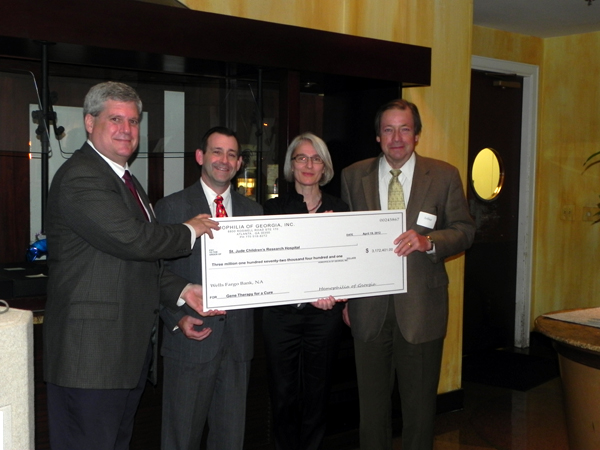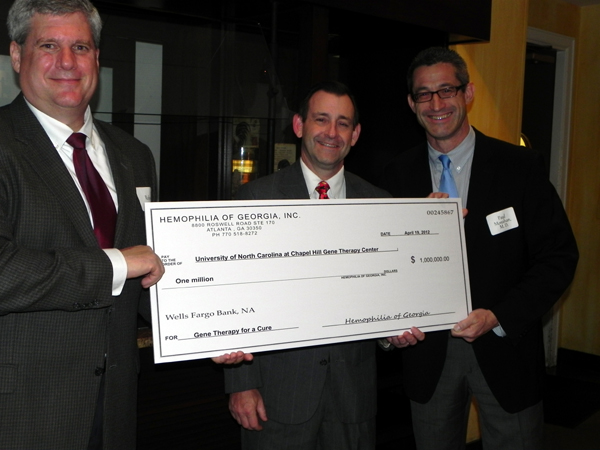Hemophilia of Georgia Announces Major Grants to Fund Clinical Trials
Horizons in Hemophilia, May 2012
By Jeff Cornett, RN, MSN, Director of Training, Research, & Advocacy
On April 19, Hemophilia of Georgia announced that it is awarding $6,730,380 to three institutions over the next three years to enable the expansion of clinical trials to cure hemophilia. The three institutions are St. Jude Children's Research Hospital in Memphis, Tennessee ($3,172,401); the University of North Carolina at Chapel Hill Gene Therapy Center ($1,000,000); and the Aflac Cancer and Blood Disorders Center at Emory University, Atlanta ($2,557,979). The Hemophilia of Georgia funding will enable these institutions to enroll more patients and progress more quickly with their clinical trials
|
St. Jude Children's Research Hospital, in conjunction with University College London, is conducting clinical trials in Memphis, Stanford (California), and London. The current trial seeks to cure hemophilia B by using Adeno-Associated Virus (AAV) subtype 8 to put the factor IX gene into the liver cells of people with hemophilia. Patients are given the gene-containing virus through a simple infusion into their bloodstream. Seven patients with severe hemophilia B have been treated this way since 2010.
All have seen the level of factor IX in their blood rise to 1 to 6%. If the researchers can achieve a level of 3%, a person without significant joint damage would no longer have spontaneous bleeds. If they can get a factor IX level of 13%, almost all joint bleeding would be eliminated. Two patients who received high doses of the gene therapy treatment had a rise in their liver enzymes two months after the treatment. They had no symptoms but the level of factor IX in their bloodstream dropped from 8-11% to 4-6%. High dose patients are now given prednisone to try to prevent this reaction.
|
The University of North Carolina at Chapel Hill Gene Therapy Center is also seeking to cure hemophilia B using AAV subtype 8. They expect to begin clinical trials within the next two months. They are using a factor IX gene with a naturally-occurring mutation that causes it to produce factor that has an activity level eight times greater than normal. They hope to ultimately achieve a factor IX level of 10 to 40%. Patients who enroll in this clinical trial will receive the treatment at Chapel Hill and then have follow-up care at their local hemophilia treatment centers.
The Emory clinical trial is unique in several respects: it is focused on hemophilia A; uses a different virus; and targets different cells in the body. Researchers at the Aflac Cancer and Blood Disorders Center want to begin clinical trials that use a lentivirus to deliver an engineered factor VIII gene into the bone marrow of patients. Lentiviruses can hold the larger factor VIII gene, insert it more effectively into a cell's genetic material, and evade deactivation by most people's immune systems.
The engineered factor VIII gene is very efficient. In experiments with mice, factor levels of 100% were achieved. The target cells to receive the factor VIII gene are hematopoietic stem cells in the bone marrow. Because these cells can reproduce, they can theoretically continue making factor VIII throughout a person's life. In order to get the gene into the stem cells, the researchers must first remove the cells from the body and expose them to the lentivirus. Once the virus has put the gene into the stem cells, the stem cells are infused back into the patient. This process involves low-doses of drugs, so it is not as simple as the factor IX trials. The researchers believe the more elaborate process is worth it to achieve a long-lasting cure. They hope to receive approval this year to begin the trial in patients.
Hemophilia of Georgia will publish updates on the clinical trial research. If you are interested in being a patient in one of the trials, talk to your hematologist. At this point, the trials are only open to those age 18 and older who do not have an active hepatitis infection or HIV.
Principal researchers from the institutions accepted checks from Hemophilia of Georgia during the Volunteer and Donor Reception on April 19th in Atlanta.


